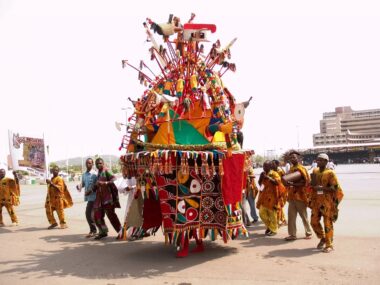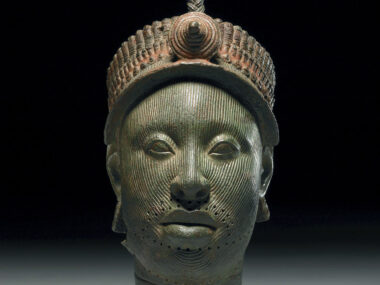Nigerian society is renowned for its hospitality and strong sense of community support, both of which are deeply embedded in its cultural ethos. Across its diverse ethnic groups and regions, Nigeria exhibits a remarkable tradition of welcoming guests and supporting community
members, reflecting values that are integral to its social fabric. This essay explores the cultural emphasis on hospitality and community support in Nigeria, examining historical roots, everyday practices, and their impact on social cohesion.

Historical and Cultural Roots of Nigerian Hospitality
Hospitality in Nigeria is not just a social nicety but a deeply ingrained cultural value that dates back centuries. This value is shared across the country’s various ethnic groups, including the Yoruba, Igbo, Hausa-Fulani, and many others. Traditional Nigerian societies often viewed hospitality as a moral obligation and a measure of one’s character and social standing.
In many cultures, the concept of “Atithi Devo Bhava,” meaning “the guest is God,” is analogous to the Nigerian ethos of treating guests with utmost respect and care. This practice is rooted in ancient traditions where travelers and visitors were offered shelter, food, and protection, recognizing that such gestures could foster goodwill, alliances, and social harmony.
Everyday Practices of Hospitality
Hospitality in Nigeria manifests in various ways, from the daily interactions within communities to the grand gestures seen during festivals and celebrations. Some common expressions of Nigerian hospitality include:
1. Warm Greetings and Welcomes:
Greeting rituals are a significant part of Nigerian hospitality. People often greet each other warmly with handshakes, hugs, and respectful inquiries about one’s well-being. In many Nigerian languages, greetings involve asking about the health and welfare of one’s family, demonstrating care and concern.
2. Offering Food and Drink:
One of the most visible expressions of hospitality is the offering of food and drink to guests. It is customary for hosts to provide their best food and drinks to visitors, regardless of their socio-economic status. Traditional Nigerian dishes such as Jollof rice, pounded yam, egusi soup, and suya are often prepared for guests, showcasing the host’s culinary skills and generosity.
3. Providing Shelter:
In rural areas and smaller communities, it is common for hosts to offer lodging to visitors who need a place to stay. This tradition extends to urban areas, where people may host family members or friends visiting from different parts of the country. The act of providing shelter is seen as a fundamental aspect of Nigerian hospitality.
4. Gift-Giving:
Gift-giving is another important element of Nigerian hospitality. Hosts often give gifts to their guests as a token of appreciation and goodwill. These gifts can range from traditional crafts and food items to more modern tokens of appreciation.
Community Support Systems
Beyond individual acts of hospitality, Nigerian culture places a strong emphasis on community support and mutual aid. This sense of community is crucial in providing social safety nets and fostering resilience among individuals and families.
1. Family and Kinship Networks:
The extended family system is a cornerstone of Nigerian society. Family members, including extended relatives, play an essential role in providing support and care. This network acts as a buffer against economic and social challenges, ensuring that no individual is left to face difficulties alone. In times of celebration or crisis, families come together to offer support, resources, and emotional comfort.
2. Age-Grades and Associations:
Many Nigerian ethnic groups have age-grade systems, where individuals of similar age are grouped together to perform communal duties and support each other. These age-grade associations often organize community projects, assist members in need, and provide a sense of belonging and purpose.
3. Cooperative Societies:
Cooperative societies are common in Nigeria, especially in rural areas. These cooperatives pool resources to support their members in various ways, such as providing loans, agricultural inputs, and assistance during emergencies. They play a crucial role in promoting economic self-reliance and collective welfare.
4. Religious Organizations:
Religious organizations, including churches and mosques, are vital sources of community support in Nigeria. These institutions not only offer spiritual guidance but also engage in charitable activities, providing food, healthcare, education, and financial aid to their congregants and the broader community. Religious festivals and events are opportunities for collective worship, celebration, and the strengthening of social bonds.
Festivals and Celebrations
Nigerian festivals and celebrations are vivid expressions of hospitality and community spirit. These events bring people together, often transcending ethnic and religious boundaries, to celebrate shared values and traditions.
1. Weddings:
Nigerian weddings are grand affairs that involve extended family, friends, and community members. The ceremonies often include traditional rites, music, dance, and feasting. Guests are treated with great hospitality, and the celebration is a reflection of communal joy and solidarity.
2. Traditional Festivals:
Festivals such as the Osun-Osogbo Festival, Durbar Festival, and New Yam Festival are significant cultural events that attract large gatherings. These festivals celebrate cultural heritage, honor deities, and reinforce community ties through shared rituals, performances, and communal feasts.
3. Religious Holidays:
Religious holidays, including Christmas, Easter, Eid al-Fitr, and Eid al-Adha, are marked by acts of hospitality and charity. Families open their homes to guests, share festive meals, and provide for the less fortunate, reflecting the religious teachings of compassion and generosity.
Impact on Social Cohesion and National Identity
The emphasis on hospitality and community support has a profound impact on social cohesion and national identity in Nigeria. These cultural practices foster a sense of belonging and mutual responsibility, which are crucial for maintaining harmony in a diverse and populous nation.
1. Bridging Ethnic and Cultural Divides:
Hospitality and community support help bridge ethnic and cultural divides by promoting understanding and cooperation among different groups. Interactions during social events and communal activities provide opportunities for people to learn about and appreciate each other’s customs and traditions.
2. Strengthening Social Safety Nets:
The strong networks of family, community, and religious support act as informal social safety nets, helping individuals and families navigate economic and social challenges. This communal approach to welfare reduces the burden on formal social services and enhances collective resilience.
3. Promoting National Unity:
National events and celebrations, such as Independence Day, provide platforms for expressing national pride and unity. These occasions highlight the shared values of hospitality and community support, reinforcing a collective Nigerian identity despite the country’s diversity.
Conclusion
Nigerian hospitality and community support are deeply rooted cultural values that play a vital role in shaping social interactions and fostering social cohesion. Through practices such as warm greetings, offering food and shelter, and gift-giving, Nigerians demonstrate their commitment to welcoming guests and supporting each other. The extended family system, age-grade associations, cooperative societies, and religious organizations further reinforce the culture of mutual aid and solidarity.
Festivals and celebrations, marked by communal participation and generosity, provide vibrant expressions of these values, contributing to social harmony and national unity. In a country as diverse and dynamic as Nigeria, the enduring emphasis on hospitality and community support remains a cornerstone of its cultural identity and social resilience.










